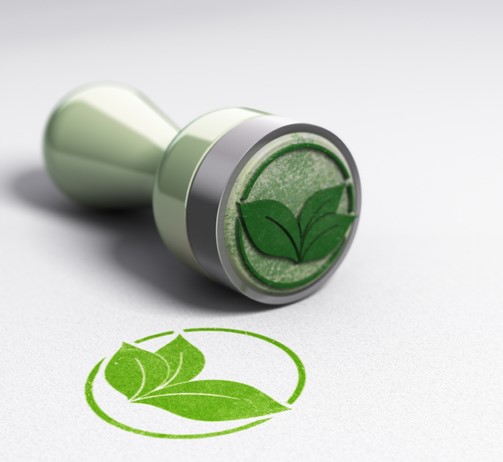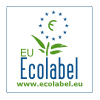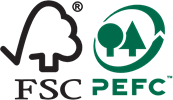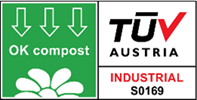Influenza



There are many certification seals and labels that attest to the (supposed) sustainability of products. In addition to many reputable certifications, there are unfortunately also occasional "bad apples" that do not take actual sustainability very seriously or that do not even refer to an independently tested product. We have compiled a list of the most important reputable certifications and labels so that they do not remain a book with seven seals for you.
The universal recycling symbol showing three arrows is probably familiar to everyone, as it has been in use worldwide since 1970 and can be found in slightly modified form on numerous types of packaging. In most countries, the use of this symbol is not subject to licensing restrictions. Manufacturers can use it to indicate that the material of the product is recyclable. However, this is not a guarantee that the material will actually be recycled.

The international recycling code is a variation of the universal recycling symbol. The symbol also consists of three arrows, but a number plus possibly an acronym also indicate what material the packaging is made of. This primarily helps consumers when making purchasing decisions and sorting waste correctly. In some countries, thanks to modern technologies, sorting plants usually no longer need this code [1].

The EU Ecolabel was established by the European Commission in 1992. The label highlights products and, since 2000, services that have a lower impact on the environment than the market average. As a so-called "Type 1 eco-label" according to ISO 14024, the EU Ecolabel fulfils the highest quality category for eco-labels. It differentiates between 24 different product and service categories. The EU Ecolabel is awarded by the respective national authorities of member states [2, 3].

The seals of the Forest Stewardship Council® (FSC) and the Programme for the Endorsement of Forest Certification (PEFC) both certify that the wood used for a product comes from sustainably managed forests. This means that forests are not overexploited and biodiversity is preserved. Furthermore, fair labour conditions are promoted and community rights are taken into account. Both organisations are internationally active and recognised [6, 7].

TÜV Rheinland (Germany) certifies industrially compostable products. Consumers can rely on the fact that certified materials, packaging and products are biodegradable and compostable and can be returned to the industrial circular economy [8].

TÜV Austria offers a similar certification, whereby a distinction is made here between industrial compostability and compostability in consumers' own gardens [9]. This distinction is important because garden compost has a lower temperature due to the smaller amount of waste and composting is therefore slower and more difficult.


Sustainability is on everyone's lips. But the related vocabulary is not always immediately understandable in detail. So that you are still able to see the wood for the trees and join in the conversation about sustainability, we have compiled the most important terms for you.
The material has been produced from renewable raw materials such as maize starch, vegetable cellulose or lactic acid. Since further processing also plays a role, bio-based materials are not necessarily biodegradable and therefore should not be disposed of blanketly in the organic waste bin. Bio-based materials are not made fromfossil raw materials, but depending on how they are produced, they can still have a large ecological footprint [1].
Biodegradable materials are naturally converted into biomass by microorganisms such as fungi or bacteria, releasing CO2, water, minerals, and possibly methane. The process may take several years. Therefore, biodegradable materials should not be disposed of in the organic waste bin or on the compost heap [1]. Note: Plastics from fossil resources can also be biodegradable. Bio-based and biodegradable therefore do not necessarily go hand in hand.

Although carbon dioxide (CO2) makes up only a very small part of the Earth’s atmosphere (1pprox. 0.04%), it has a major impact on global warming. This is because it absorbs heat and reflects it back to Earth instead of releasing it into space [2].
Processes or production steps frequently release not onlyCO2, but also other greenhouse gases such as methane (CH4) or nitrous oxide (N2O). Since CO2 is most relevant for man-made climate change, the total amount of greenhouse gases released is often expressed as so-called CO2 equivalents (CO2e). In this context, CO2 serves as a reference gas into which the greenhouse effect of the other gases is converted [3].
The carbon footprint is the estimated emission of a product or its CO2 impact. The entire life cycle of the product is taken into account: from raw material extraction to production, storage, transport, and use to final disposal or recycling. The term indicates how much greenhouse gas is released in total and is often expressed in CO2 equivalents (CO2e) [4]. However, the carbon footprint should not be used as the only measure of sustainability. It is also crucial, for example, how much water a process or product consumes during production, use, and subsequent maintenance.
Greenwashing refers to when a product is portrayed as particularly sustainable, environmentally friendly, and "green" even though there is no evidence to support it. Manufacturers who engage in greenwashing sometimes use made-up labels instead of certified test seals. Greenwashing is deliberate deception that can be fined under the proposal of the European Commission (Proposal for a Directive on Green Claims) [6].
Climate neutrality means that the same amount of greenhouse gases (CO2 equivalents, CO2e) is emitted as is absorbed from the atmosphere. In contrast, in so-called climate offsetting, greenhouse gases are saved in a sector other than the one that generates the emissions [7].
Composting refers to the process by which (organic) matter isbroken down under the influence of oxygen and the release of CO2. There are various institutes, test seals and labels that indicate compostability. Compostability of plastics is tested according to EN 13432. According to this standard, the product to be tested must be 90% decomposed within 90 days in an industrial composting plant. In order to exclude ecotoxicity of the product, the quality of the general compost must not be negatively affected by its decomposition [8].
A product or material is recyclable, if it can be broken down or shredded into its components and used as a recovered raw material for new products when it has reached its maximum service life. Whether a product is recyclable depends significantly on whether its individual components can be properly isolated from each other in practice [9].
So-called composite foils,for example, are not recyclable. Although these consist of different recyclable plastics, they are inseparably fused together during foil production. Therefore, the foil can only be thermally recycled ‒ i.e. incinerated. So-called monofoils, which consist of only one type of plastic, are more sustainable. These are almost completely recyclable.
The resource consumption of a person, country or company can be converted into a hypothetical biologically productive area that would be necessary to meet the needs of this person/country/company. The total area is called the ecological footprint and includes, among other things, areas for the production of food, energy, clothing, and waste disposal [10].